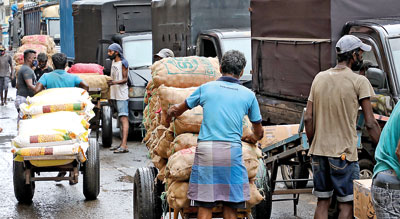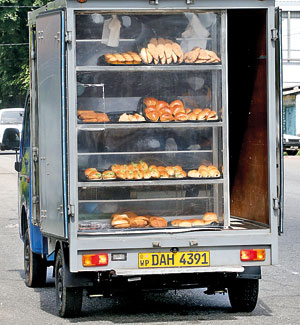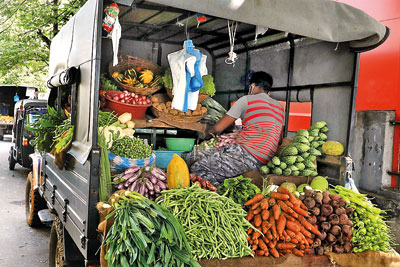News
Life is going to get tougher as fuel hikes hit home

A scene at Pettah market
Get ready to cut down your weekly budget by sacrificing on groceries, cutting travel expenses and delaying purchases of clothes and non-essential items as the fuel price hike is expected to hit middle and low-income earners hard once travel restrictions are lifted.

Managing Director of Ragagiriya Tours and Travels, Nishantha Basnayake
Last week, petrol octane 95 was increased by Rs. 23 a litre and now sells at Rs. 184. Octane 92 saw an increase of Rs. 20, selling now for Rs. 157 a litre. Auto diesel was increased by Rs. 7 and is now Rs. 111. Super diesel was increased by Rs. 12 to Rs. 144. Kerosene was not spared, increasing by Rs. 7 to Rs. 77.
Due to travel restrictions, immediate price increases were reflected in vegetables, with retail prices skyrocketing.
A kilo of beans has increased from Rs. 224 this time last year to Rs. 300, and brinjals from Rs.189 to Rs. 232. Radish is being sold for Rs. 188 a kilo, up almost Rs. 40 from last year. Capsicum is Rs. 380-400 a kilo, up from Rs. 250.
Cabbage is Rs. 224, an increase from last year’s Rs.173. Ladies fingers is Rs. 195, up from Rs. 161, drumsticks up from Rs. 425 to Rs. 568, and carrots up by about Rs. 50 to Rs. 250. Bitter gourd rose Rs. 14 from last week to Rs. 287 and green chillies Rs.23 to Rs. 388.
Wholesale prices are low, said Traders Association President at the Manning Market, Lal Hettige, with most vegetables being bought by traders for Rs. 100-160 a kilo.
A vegetable vendor said retail vegetable prices have risen threefold as retailers know people cannot travel to find lower-priced vegetables and other essential food commodities.

To rise: Price of bakery goods
These price increases, together with the increased cost of coconut oil and condiments, will send up prepared food prices, from lunch packets from the local buth kade to a star-class restaurant.
Although wholesale importers are yet to increase prices of imported essential goods especially dry rations, retailers increased the prices as soon as the fuel hike was announced, Essential Food Commodities Importers and Traders Association President G. Rajendran told the Sunday Times.
Prices of breakfast pulses continue to stay high with cowpea sold at about Rs. 730 a kilo in the retail market almost double last year’s price. Green gram is Rs. 900-1000 in the market, an increase from last June’s Rs. 324, while chickpeas have gone up by about Rs. 50.
Garlic, which was sold for Rs. 470 a kilo last week, has increased to Rs. 482. Both the sour condiments, goraka and tamarind, have gone up between Rs. 100-170 to Rs. 643 and Rs. 573 respectively.
Mysore dhal too has seen an increase from last year’s Rs. 172 to Rs. 213. A 750ml bottle of coconut oil fetches Rs. 570 whereas last year it was Rs. 389.
Bakery goods will cost Rs. 5-50 an
item and could go higher, Bakery
Owners Association President N.K. Jayawardena said.

Kiribathgoda: Veggies on wheels at a price
“We are struggling with costly vegetable prices and fish options limited by the ship disaster (fishing was ordered suspended after the MV X-Press Pearl caught fire and sank off the coast, leaking poisonous chemicals into the water).” the President of the Housewives Association, Dianna Anne Rizvi, said.
“Some mothers are unable to go to work as their children are at home. Household incomes are reduced as many people suffered pay cuts. The fuel price hike will have a big impact on women who run households,” Mrs Rizvi said
Private Bus Association President Gemunu Wijeratne said public transport companies are suffering due to travel restrictions and cost increases.
“Lubricants have gone up by 30 per cent, tyres by 18 per cent, now diesel prices have increased, and spare parts from India have gone up in price by 50 per cent or more,” Mr. Wijeratne said.
“As (under COVID-19 regulations) buses have to operate seating capacity like in luxury buses, we have asked the National Transport Commission to increase charges for seating capacity to 1.5 per cent from 1.2 per cent,” he said.
Car and van hire companies that have been transporting bank and office staff while public transport is unavailable have increased charges by Rs. 2 per kilometre, Managing Director of Ragagiriya Tours and Travels, Nishantha Basnayake, said. “Though the diesel prices are quite low, the price hike in petrol will be felt,” he added.
“Rice prices are outrageous,” Ranjith Vithanage, President of the National Movement for Consumer Rights, said. “There is no price control with quality samba prices going up to about Rs. 200 per kilo.
“Price regulation for rice has proven to be a failure. Apart from food prices, there will be an increase in the cost of necessities like rent and transport and tuition. People will have to work overtime, night shifts and try to find other means of income.”
Additional reporting and pictures by M.A. Pushpa Kumara

Manning market: Wholesale prices are low

